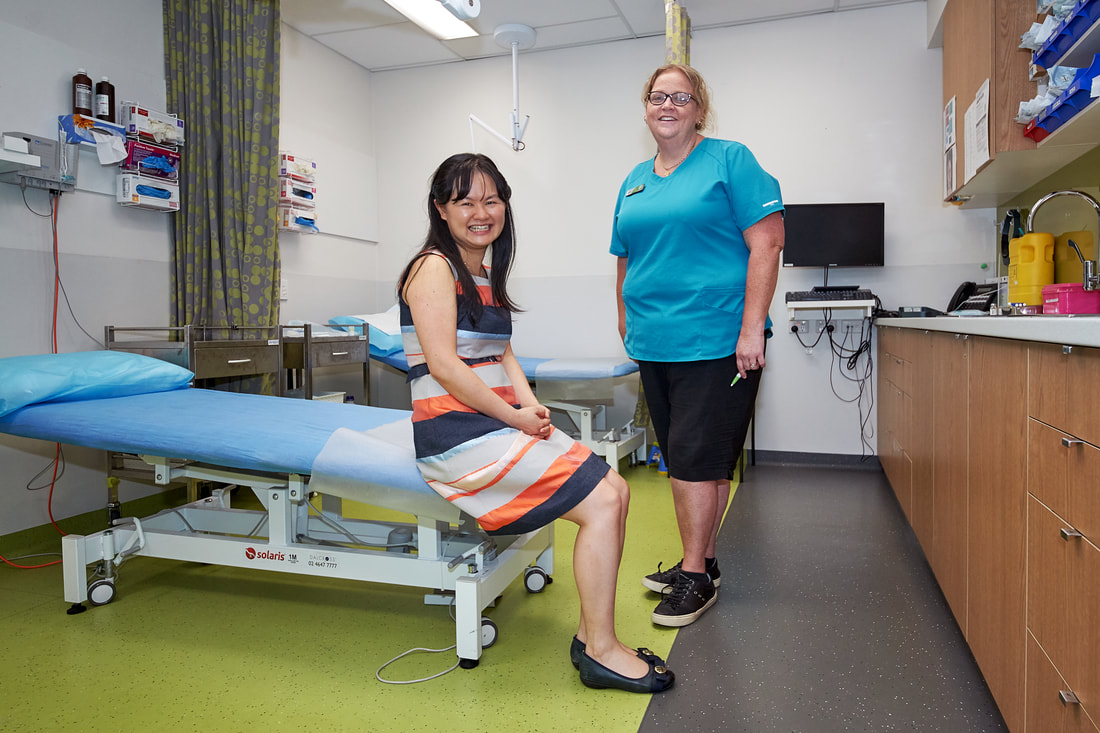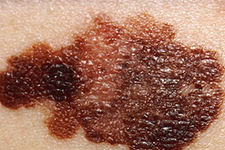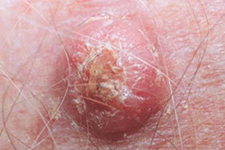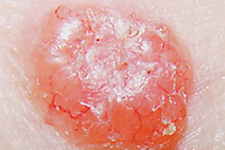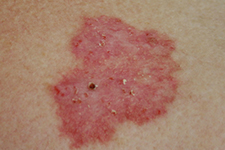SKIN CANCER CLINIC
HOW ARE WE DIFFERENT FROM YOUR GP?
- The Doctors at Springwood Skin Cancer Clinic have taken postgraduate training in skin cancer medicine and are Fellows of the Australian College of General Practitioners who have a special interest in skin cancer detection and management.
- Our Doctors who have a special interest in skin cancer detection and management are:
- Dr Chris Hannon
- Dr Dora Lee
- Dr Garth Kline
- Dr Cole Rudolph
- Dr Chris Hannon
- Dr Chris Hannon, MBBS, FRACGP has a diploma with the Australasian Skin Cancer College and Dr Dora Lee, B PHTY MBBS, FRACGP holds a certificate with the Australasian Skin Cancer College. Dr Hannon and Dr Lee are both members of the International Dermoscopy Society.
HOW DO WE DIAGNOSE SKIN CANCERS?
Firstly we examine all sun exposed areas from top to toe - literally! Melanomas in particular can appear anywhere, even on the soles of your feet. Your skin cancer doctor then assess any suspicious lesions with the latest equipment and technology. Dermatoscopes are devices which allow the skin cancer doctor to analyse your spots in great detail. High resolution details can be seen with a dermatoscope that may not be obvious with naked eye and the image can be photographed and saved for future monitoring. Dermatoscopes are the only melonoma detection device with Level 1 evidence and the only device recommended by the NH&MRC to assist in the detection of melanoma.
WHAT SHOULD PROMPT A SKIN CANCER CHECK?
- Any person with fair skin, especially if you have ever been badly sunburnt (this doubles melanoma risk)
- Any change in a skin spot - this includes a mole that has changed in size, colour or shape
- A new spot that has not been there previously, especially a new mole on the face
- A sore on the skin that just won't heal or keeps breaking down
- A mole that bleeds definitely needs to be checked
- A small lump that is pearly and pink
- Any spots that concern you or your family
TYPES OF SKIN CANCER
|
Melanoma
Dark, with irregular edges Forms in pigment cells |
Squamous Cell Carcinoma
Forms on the surface of skin Rapidly growing, red, scaly bump |
Basal Cell Carcinoma Translucent, fleshy colour
with tiny blood vessels Forms in the lower epidermis |
Intraepidermal Carcinoma
Present only in the top skin layer Slow spreading |
HOW DO WE MANAGE SKIN CANCERS?
The key to managing any condition in medicine is a good diagnosis - skin cancer medicine is no different.
There are occasions where the diagnosis of skin cancer can be made with a high degree of certainty by a skin check.
There are many more occasions where our suspicions need to be confirmed by performing a small skin biopsy. This is a quick, simple procedure where a tiny piece of skin is sampled and sent to the pathologst for analysis. This gives us 100% certainly regarding the diagnosis and means you only have the skin cancer treatments that are necessary. Results are usually back in 48 hours.
A variety of non-surgical and surgical options are available to treat skin cancers.
Deep, invasive skin cancers and melanomas always need excising (cutting out).
More superficial skin cancers can be treated in a variey of ways - scraped off the skin (curette) or using creams such as Efudix or Aldara.
There are many treatment options for a skin cancer and the doctors at the Springwood Skin Cancer Clinic will consider your individual factors when formulating your treatment option. The treatment options will depend on what type of skin cancer it is, where the cancer is located as well as the size of the cancer. The doctors at Springwood Skin Cancer Clinic will consider these factors and present an individually tailored treatment option that optimises the cosmetic result and healing.
There are occasions where the diagnosis of skin cancer can be made with a high degree of certainty by a skin check.
There are many more occasions where our suspicions need to be confirmed by performing a small skin biopsy. This is a quick, simple procedure where a tiny piece of skin is sampled and sent to the pathologst for analysis. This gives us 100% certainly regarding the diagnosis and means you only have the skin cancer treatments that are necessary. Results are usually back in 48 hours.
A variety of non-surgical and surgical options are available to treat skin cancers.
Deep, invasive skin cancers and melanomas always need excising (cutting out).
More superficial skin cancers can be treated in a variey of ways - scraped off the skin (curette) or using creams such as Efudix or Aldara.
There are many treatment options for a skin cancer and the doctors at the Springwood Skin Cancer Clinic will consider your individual factors when formulating your treatment option. The treatment options will depend on what type of skin cancer it is, where the cancer is located as well as the size of the cancer. The doctors at Springwood Skin Cancer Clinic will consider these factors and present an individually tailored treatment option that optimises the cosmetic result and healing.
FEES
To ensure high quality service and equipment a gap is charged for consults and procedures - a proper skin examination takes time. A comprehensive skin check cannot be done in a brief consultation so we allow for 15 to 20 minute consultation times.
APPOINTMENTS
Appointments can be made with Springwood Skin Cancer Clinic by ringing 3208 6122 or online.
Please wear clothing that is easy to remove. Underwear is not removed as part of the skin cancer check.
As the face is one of the most common sites for skin cancer it is essential that no make-up is worn. Nail polish can hide melanomas that grow under nails, so should be avoided as well.
Both male and female skin cancer doctors are available and please inform our friendly receptionist if you have a preference.
A skin cancer assessment consultation will include a skin cancer history, a relevant family history and your skin type will be assessed.
The doctor will carefully examine any lesions you are concerned about and perform a thorough head to toe skin check. At least 15 min appointment is allowed for this. Magnification, dermoscopy and digital photography is used where necessary to assist with the assessment.
If no suspicious lesions are found, an appropriate future recall system will be put into place depending on the assessment of your future risk and your doctor will discuss skin cancer prevention and awareness.
If suspicious lesions are detected, the doctor will discuss and recommend options for management of the suspicious lesions. This may include digital monitoring, biopsy, excision or non surgical managements or referral to a plactic surgeon.
The doctors at Springwood Skin Cancer Clinic undertake skin excisions onsite in a fully equipped treatment room. The doctors are trained to perform grafts or flaps where necessary to minimise skin tension and optimise cosmetic results.
Please wear clothing that is easy to remove. Underwear is not removed as part of the skin cancer check.
As the face is one of the most common sites for skin cancer it is essential that no make-up is worn. Nail polish can hide melanomas that grow under nails, so should be avoided as well.
Both male and female skin cancer doctors are available and please inform our friendly receptionist if you have a preference.
A skin cancer assessment consultation will include a skin cancer history, a relevant family history and your skin type will be assessed.
The doctor will carefully examine any lesions you are concerned about and perform a thorough head to toe skin check. At least 15 min appointment is allowed for this. Magnification, dermoscopy and digital photography is used where necessary to assist with the assessment.
If no suspicious lesions are found, an appropriate future recall system will be put into place depending on the assessment of your future risk and your doctor will discuss skin cancer prevention and awareness.
If suspicious lesions are detected, the doctor will discuss and recommend options for management of the suspicious lesions. This may include digital monitoring, biopsy, excision or non surgical managements or referral to a plactic surgeon.
The doctors at Springwood Skin Cancer Clinic undertake skin excisions onsite in a fully equipped treatment room. The doctors are trained to perform grafts or flaps where necessary to minimise skin tension and optimise cosmetic results.
DID YOU KNOW?
- Skin cancer accounts for around 80% of newly diagnosed cancers
- 2 out of 3 Australians will be diagnosed with skin cancer by the age of 70
- People aged 50 years or more have the highest rate of skin cancers


